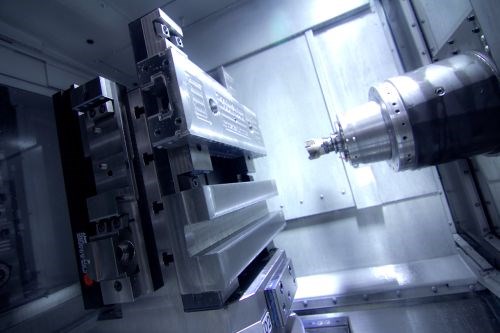A Different Approach to Tool-Break Detection
A standard feature on the CNC of this shop's workhorse machine helps improve confidence in unattended runs.
Share







Takumi USA
Featured Content
View More
Hwacheon Machinery America, Inc.
Featured Content
View More
Mr. Sun’s Mori Seiki NHX4000 pre-bores a pilot hole on a vise body via helical interpolation.
This article from a recent MMS issue describes how low-profile clamps from Mitee-Bite facilitated the high-density fixturing necessary for one fledgling manufacturer to take full advantage of a twin-pallet HMC with tombstone fixturing. However, just as there's only so much space on a tombstone, there's only so much space in a given article. As such, the piece is by no means comprehensive in its treatment of the strategies that shop owner Eric Sun employs to make the most of his production resources.
One example is his use of tool load monitoring, which comes standard on his HMC's CNC. By writing a simple program that directs the machine to drill portions of the workpiece where material should already have been cut away, Mr. Sun can detect tool breakage without the use of a separate probe. "If we take a small drill and go into an existing hole where there shouldn't be any material, and tool load monitoring measures any load at all, I know the tool broke and the hole wasn't drilled properly," he explains. "This built-in CNC feature provides a lot more confidence for our longer unattended runs."
Of course, this approach is viable not just for drilled holes, but also milled features such as pockets, slots and so forth. Mr. Sun adds that it is also useful for checking setups. For example, he might use tool load monitoring determine whether a fixture that is supposed to be empty actually is so. Likewise, he can ensure that the correct workpiece is loaded in cases when different-size parts share the same fixture for their respective machining routines.
Related Content
-
Custom Workholding Principles to Live By
Workholding solutions can take on infinite forms and all would be correct to some degree. Follow these tips to help optimize custom workholding solutions.
-
Rail Manufacturer Moves Full Steam Ahead with Safe, Efficient Workholding Solution
All World Machinery Supply paired a hydraulic power unit with remote operating capabilities in a custom workholding system for Ahaus Tool & Engineering.
-
Medical Shop Performs Lights-Out Production in Five-Axes
Moving to five-axis machining enabled this shop to dramatically reduce setup time and increase lights-out capacity, but success relied on the right combination of workholding and automation.




































.jpg;maxWidth=300;quality=90)


